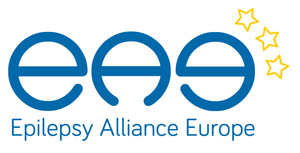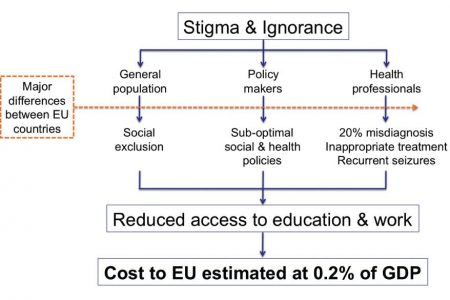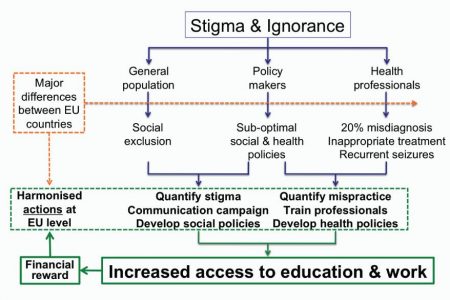Vision
While lack of knowledge about epilepsy is a prevalent issue in all EU countries, major differences between EU Member States are also observed in access to medical and medico-social care of persons with epilepsy.
The main actions developed at the EU level have been directed towards research and acknowledgment of the importance and specificities of epilepsy.
Epilepsy Research
Regarding research, several major programs have been funded by the EU, including the seminal EPICURE project within FP6 (about €12 million), and up to €50 million within various Funding Program FP7 calls. These programs were primarily aimed at promoting breakthrough and innovative research, with the view to enable major advances in the field for academia and industry.
While this strategy proved successful in stimulating basic research, it raises some concerns that deserve attention for the future:
- In parallel to the progress in the neurobiology of epilepsy, important advances in the care of people with epilepsy could be rapidly achieved if appropriate clinical research was funded at the EU level. In fact, high impact clinical research requires levels of funding and recruitment capacities that are not available in most European countries. One exception is the UK, which happens to have been the leading (if not exclusive) EU country funding extensive clinical research in epilepsy – thanks to MRC policy – rapidly translating into practice recommendations. Expanding this type of research at the EU level would enable addressing more issues, more rapidly, and with a greater impact on epilepsy care throughout Europe.
- The intrinsic complexity and heterogeneity of the epilepsies hampers short term effective translational research. Thus, while basic research is the primary way to future innovative treatment and requires sustained support at the EU level, it is unlikely to fulfill the expectations of persons with epilepsy regarding tangible improvement in clinical care within Horizon 2020.
Regarding acknowledgment of the importance and specificities of epilepsy in Europe, a momentum was achieved when the European Parliament approved, by an over whelming majority, the EU Written Declaration on Epilepsy 22/2011 in September 2011. Besides its direct impact on the FP7 and other health-related EU programs, this declaration intends to promote actions in favor of epilepsy by each member state.
Strategic Plan
Our Strategic Plan is to promote, prevention, treatment and research of epilepsy within Horizon 2020. Such a plan can only be executed by facilitating and promoting tactical cooperation among WHO/EU Member states, and through partnerships with key stakeholders. Most importantly, Horizon 2020 should allow the implementation of actions with a tangible and measurable impact upon the medical and social situation of European citizens with epilepsy.
Stigma, ignorance, and disparities in knowledge and quality of care across EU countries represent the foundations of the plan, since these issues are considered of primary importance to both the commissioners and MEPs. It also appears instrumental to stress the potential for short-term financial reward to the EU, as delineated in the figure below. This requires setting up projects that could monitor impact on health and health-economy indicators.
Within that framework, specific objectives need to be delineated:
- Close the data gap and prevent epilepsy and its consequences (g., epileptogenesis, risk factors such as traumatic brain injury, stroke and CNS infections. better seizure control, depression, discrimination, epilepsy-related deaths)
- Improve health care (Improve diagnostic method, Improve access to correct management centers, Build health care workforces, Establish accreditation of epilepsy centers and on epilepsy care network) and community services (Daycare, school, employment, transportation, housing, sports, and recreation to improve QOC, Improve access to correct diagnostic centers)
- Raise awareness and improve education at all levels
- Strengthen legal frameworks to protect the human rights of people with epilepsy
- Encourage research
- Make epilepsy a top health priority.



